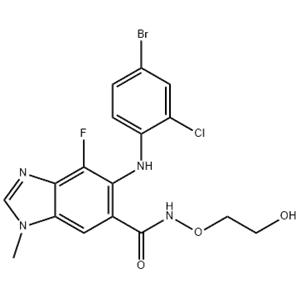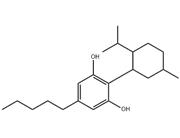Email: sales@anbuchem.com
Whatsapp:+8618638608485
24 hours online, Welcom to inquiry.
Selumetinib Basic information
Indications and Usage Mechanisms of Action Clinical Research
Product Name: Selumetinib
Synonyms: ARRY 142886;AZD 6244;5-[(4-Bromo-2-chlorophenyl)amino]-4-fluoro-N-(2-hydroxyethoxy)-1-methyl-1H-benzimidazole-6-carboxamide;6-(4-bromo-2-chloroanilino)-7-fluoro-N-(2-hydroxyethoxy)-3-methylbenzimidazole-5-carboxamide;Selumetinib AZD624;5-[(4-Bromo-2-chlorophenyl)amino]-4-fluoro-N-(2-hydroxyethoxy)-1-methyl-1H-benzimidazole-6-car;Selumetinib, 99%, a highly selective MEK1 inhibitor;Selumetinib, Free BaseAZD6244ARRY-142886
CAS: 606143-52-6
MF: C17H15BrClFN4O3
MW: 457.68
EINECS: 207-313-3
Product Categories: MAPK;Inhibitors;Aromatics;Heterocycles;apis;Antineoplastic;API;Inhibitor;Intermediates & Fine Chemicals;Pharmaceuticals;Research
Mol File: 606143-52-6.mol
Selumetinib Structure
Selumetinib Chemical Properties
Melting point >219°C (dec.)
density 1.69
storage temp. -20°
solubility Soluble in DMSO (up to 50 mg/ml) or in Ethanol (up to 2 mg/ml)
form Beige powder.
pka 14.20±0.10(Predicted)
color White
Stability: Stable for 1 year from date of purchase as supplied. Solutions in DMSO or ethanol may be stored at -20° for up to 2 months.
Safety Information
HS Code 29349990
MSDS Information
Selumetinib Usage And Synthesis
Indications and Usage Selumetinib, 1 has a chemical name of 5-[(4-Bromo-2-chlorophenyl)amino]-4-fluoro-N-(2-hydroxyethoxy)-1-methyl-1H-benzimidazole-6-carboxamide. It was developed by British company AstraZeneca and is used to treat advanced non-small cell lung cancer (NSCLC). It is mainly used to treat bile duct cancer, colon cancer, NSCLC, etc. Currently, Selumetinib is in stage III clinical trials for treatment of NSCLC.
Mechanisms of Action Selumetinib is the first mitogenextracellular kinase (MEK1/2) inhibitor to be used in thyroid cancer clinical trials. It inhibits extracellular signal regulating kinase (ERK/2) and activates caspase to dramatically inhibit ERK1/2 phosphorylation.
Clinical Research In phase II clinical trials of radioiodine-refractory papillary thyroid carcinoma, 39 patients took daily oral doses of Selumetinib (100mg bid) for 28 days; results showed that 21 patients’ conditions stabilized (54%), 11 patients’ conditions worsened (28%), 49% patients’ conditions were stable for 16 weeks, 36% patients’ conditions were stable for 24 weeks, and survival terms did not progress to 32 weeks. Negative reactions mainly consisted of rashes (59%), diarrhea (44%), and weakness (41%). Some studies found that after treating 20 patients with thyroid cancer with Selumetinib (75mg bid) for 4 weeks, Selumetinib increased the iodine uptake and retention of patients with radioiodine-refractory papillary thyroid carcinoma. In a blind and random comparative study between a Selumetinib and Docetaxel (DOC) combination treatment group and DOC and placebo treatment group for 87 mutant NSCLSC patients, survival times were 9.4 months and 5.2 months, PFS were 5.3 months and 2.1 months, RR were 37% and 0%, thus showing dramatic differences. Selumetinib’s main negative reactions include neutrophil depletion, dermatitis, and respiratory failure.
Description Selumetinib (AZD6244; ARRY-142886) is an oral MEK inhibitor. In a random�ized trial, NSCLC patients with wild-type KRAS were randomized to erlotinib alone or combination therapy with selumetinib, while mutant KRAS patients were randomized to selumetinib alone or combination therapy. The primary end points were PFS for the KRAS wild-type cohort and objective response rate (ORR) for the KRAS mutant cohort. Results were not impressive, with no PFS difference in the KRAS wild-type arm (2.4 vs. 2.1?months) and no ORR difference in the KRAS�mutated subgroup (0% vs. 10%). A planned trial of selumetinib in combination with the anti-PD-L1 antibody durvalumab has since been suspended (NCT03004105).
Uses It is a tight-binding, uncompetitive inhibitor of mitogen-activated protein kinase kinases (MEK) 1 and 2 currently in clinical development. It is useful as biomarker in human lung cancer cell. Potent MEK inhibitor.
Uses It is a tight-binding, uncompetitive inhibitor of mitogen-activated protein kinase kinases (MEK) 1 and 2 currently in clinical development.
Definition ChEBI: A member of the class of benzimidazoles that is 1-methyl-1H-benzimidazole which is substituted at positions 4, 5, and 6 by fluorine, (4-bromo-2-chlorophenyl)amino, and N-(2-hydroxyethoxy)aminocarbonyl groups, respectiv ly. It is a MEK1 and MEK2 inhibitor.
target MEK1
References 1) Davies?et al. (2007),?AZD6244(ARRY-142886), a potent inhibitor of mitogen-activated protein kinase/extracellular signal-regulated kinase kinase 1/2 kinases: mechanism of action in vivo, pharmacokinetic/pharmacodynamics relationship, and potential for combination in preclinical models; Mol. Cancer Ther.,?6?2209 2) Yeh?et al. (2007),?Biological characterization of ARRY-142886 (AZD6244), a potent, highly selective mitogen-activated protein kinase kinase 1/2 inhibitor; Clin. Cancer Res.,?13?1576 3) Catalanotti?et al. (2013),?Phase II trial of MEK inhibitor selumetinib(AZD6244) in patients with BRAFV600E/K-mutated melanoma; Clin. Cancer Res.,?19?2257 4) O’Neil?et al. (2011),?Phase II study of the mitogen-activated protein kinase 1/2 inhibitor selumetinib in patients with advanced hepatocellular carcinoma; J. Clin. Oncol.,?29?2350 5) Khurum?et al. (2012),?A phase I dose escalation study of oral MK-2206 (allosteric Akt inhibitor) with oral selumetinib (AZD6244)(MEK 1/2 inhibitor) in patients with advanced or metastatic solid tumors; J. Clin. Oncol.,?30?e13599 6) Hainsworth?et al. (2010),?A phase II, open label, randomized study to assess the efficacy and safety of AZD6244 versus pemetrexed in patients with non-small cell lung cancer who have failed one or two prior chemotherapeutic regimens; J. Thorac. Oncol.,?5?1630 7) Bodoky?et al. (2012),?A phase II open-label randomized study to assess the efficacy and safety of selumetinib (AZD6244) versus capecitabine in patients with advanced or metastatic pancreatic cancer who have failed first-line

 China
China



